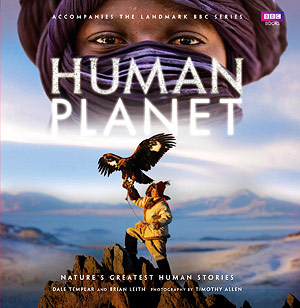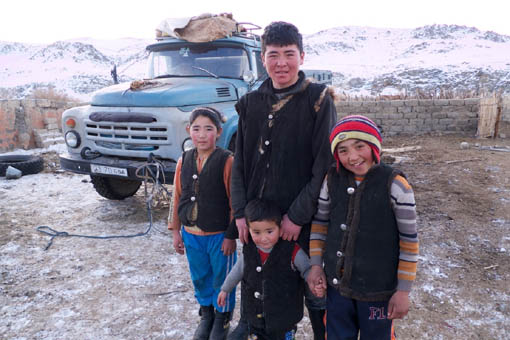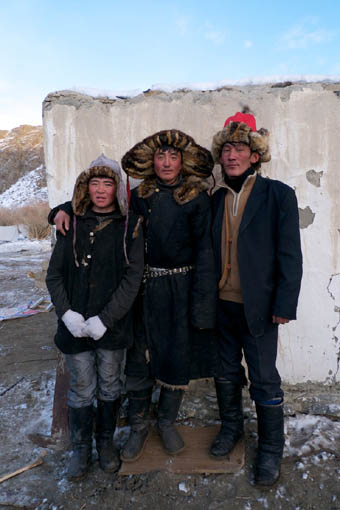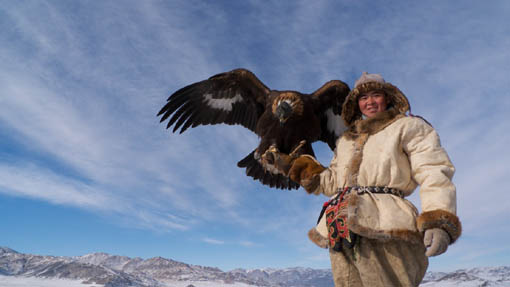15 Minutes of Fame Across the World
by Karina Moreton, Mongolian Fixer, Human Planet
The Human Planet series is made up of over 70 individal stories, each several minutes in length. As many of you will have gathered from the “Behind the Lens” snippets at the end of each episode, filming these sequences is never easy. Not only were there the challenges of the film crew – such as how to deal with ice melting; cliff edges and tides turning, there are the stories of the people portrayed. For some of them, the whirlwind of a film crew living with them was years ago now and they have gone about their daily lives since. Now that the series is out, will anything change for them?

Berik from Human Planet's Mountains programme features on the book's cover
Berik from the Mountains programme is 16 years old. This is him and his eagle on the front of the book that accompanies the series. The book and programmes will be distributed worldwide and it’s hoped they will reach a huge audience. This is more than 15 minutes of fame! Around the world there is a culture of stardom – what would the teenagers from ‘Fame Academy’ and other talent shows give for this exposure? Some could worry that it might go to his head.

Berik with his cousins at his family home in Altansogts (image copyright Dina Mufti)
I’d like to show a photo or a clip of Berik looking at the book or DVD and giving his reactions. This however isn’t possible. Although copies of the book are on the way to Berik, they will take another 40 days to reach him. ’Outer’ Mongolia is considered to be the back of beyond, and Berik lives in one of the most remote parts of the country. I don’t anticipate that Berik will be exposed to his ‘fame’ until the next Eagle Festival.

Berik with his older eagle hunting friends … before his first big hunt. (Image copyright Dina Mufti)
I think initially it will be the pages they feature in that will be the most thumbed through, though, with time, the other pages will be the ones that hold their attention. Over the last ten years of travelling through Mongolia, I have shown the reindeer herders of the north photographs of the camel herders in the south and I have shown young children photos of wolves and argali, animals that they have only dreamt of. Suddenly through this book, the Kazakh Eagle hunters of Mongolia are connected with not only the horse and camel breeders of central and southern Mongolia, but now they have shared an experience with the narwhal hunters of Greenland, mussel hunters of Canada and the honey gatherers of Nepal.

Berik, shortly after he catches his first fox …now officially a 'Kazakh man' (Image copyright Dina Mufti)
Mongolia is a landlocked country, so the images of the sea gypsies in the Pacific will no doubt enthral them. The bird of paradise hunter with his colourful headdress and nose piercing will amuse them. The naked Suri fighters will bemuse them. It is however I believe the story of the falconer in Dubai that will fascinate them. So much in common – for he also trains birds of prey to hunt, and yet they are in such a totally different world. Coming from a country with a rural population density of 0.9 people per square kilometre, it is almost inconceivable for a Mongolian to comprehend what it would be like to live in Dubai where there are 408 people per square kilometre.
Rural urban migration is a problem in Mongolia. Teenagers are attracted to the bright lights of the city. Berik might still be pulled away from his traditional way of life, but I think that perhaps the series will have changed the prospects for him and other young eagle hunters. By hosting occasional visitors who want to experience their culture first hand, this and other communities like them, have a renewed pride in what they do and a much-needed supplementary source of income.
After the characters in the Human Planet series have had their 15 minutes of fame, the book and the DVD will live on and spread their stories around the world. Many of the traditions and practises shown in the series may not survive until eternity.
Perhaps though, unknowingly, by exposing some of the characters to ‘others’ they may have slowed down the demise of man’s diversity?
